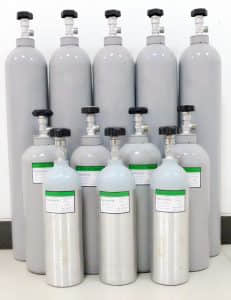Introduction
Excimer lasers stand as a cornerstone technology across various industries, from semiconductor manufacturing to medical procedures. The efficacy of these lasers heavily relies on the specific gases utilized within them. Understanding the diverse types or compositions of Excimer laser gases available from suppliers is crucial for optimizing laser performance in different applications.

Overview of Excimer Laser Gases
Excimer gases are fundamental components in generating high-energy laser beams. Comprised of various combinations, the most common Excimer gases include fluorine-based, xenon-based, and krypton-based compositions. Each gas type exhibits unique characteristics, making them suitable for specific laser applications within industries such as semiconductor fabrication, medicine, and research.
Excimer Laser Gas Offerings by the Company
Suppliers specializing in Excimer laser gases play a pivotal role in providing an extensive range of gas compositions tailored to meet the specific requirements of diverse laser systems. These offerings encompass a spectrum of gas types, compositions, and specialized blends engineered to optimize laser performance across various industrial and medical applications.
- Fluorine-Based Gases
Fluorine-based Excimer gases, such as fluorine and argon fluoride, constitute a crucial segment of offerings supplied by leading companies. These gases find widespread use in semiconductor lithography, where precision and stability are paramount for microelectronic fabrication processes. Fluorine-based gases aid in photolithography, enabling the precise etching and patterning of semiconductor wafers, crucial in the production of integrated circuits and microchips.
- Xenon-Based Gases
Xenon-based Excimer gases, including xenon chloride and xenon fluoride, hold significance in various industrial and medical laser applications. Xenon chloride is notably used in the medical field for excimer laser systems performing refractive eye surgeries like LASIK (laser-assisted in situ keratomileusis). These gases contribute to the precise reshaping of the cornea, correcting vision disorders with exceptional accuracy.
- Krypton-Based Gases
Krypton-based Excimer gases, particularly krypton fluoride, are essential components in high-energy laser systems used in scientific research and industrial applications. These gases contribute to the creation of short-wavelength, high-power laser beams suitable for various material processing, spectroscopy, and photochemistry applications. Krypton fluoride lasers are known for their high-energy output and wide spectral range, enabling versatile applications in scientific and industrial realms.
- Specialty Gas Blends and Custom Formulations
In addition to standard gas compositions, suppliers often offer specialty gas blends and custom formulations tailored to meet specific customer demands. These bespoke gas solutions are meticulously designed to address unique requirements, such as optimizing laser performance, achieving specific wavelengths, or enhancing precision in targeted applications. Collaborative partnerships between suppliers and customers often result in the development of tailored gas blends catering to specialized laser technologies.
- Comprehensive Solutions for Diverse Laser Technologies
Leading suppliers not only offer a wide array of Excimer gas compositions but also provide comprehensive solutions for diverse laser technologies. This includes guidance on gas selection, system integration, maintenance support, and ongoing technical assistance. These solutions cater to an extensive range of industries, from semiconductor manufacturing and scientific research to ophthalmology and medical device fabrication.
Conclusion of Excimer Laser Gas Offerings
The diverse range of Excimer laser gas offerings by suppliers showcases a commitment to innovation and precision in laser technology. These gas compositions, whether standard or custom formulations, play an instrumental role in facilitating precise and efficient laser applications across various sectors. The collaborative efforts between suppliers and customers in developing tailored gas solutions contribute significantly to advancing laser technology and its myriad applications.
Applications and Suitability of Excimer Laser Gases
Different types or compositions of Excimer gases find application across a broad spectrum of industries. Fluorine-based gases, such as fluorine and argon fluoride, are prevalent in semiconductor lithography. Xenon chloride and krypton fluoride, among others, are commonly used in medical procedures like refractive eye surgery. Understanding the suitability of these gases for specific applications aids in selecting the optimal gas composition for desired laser outcomes.
Quality and Purity Standards
Purity levels are paramount in Excimer laser gases to ensure laser stability, efficiency, and reliability. Suppliers adhere to stringent quality control measures, complying with industry standards and certifications to guarantee high-purity gases. Purity specifications often range from parts per million (ppm) to parts per billion (ppb) for impurities, ensuring minimal interference in laser performance.
Customer Support and Technical Information
Suppliers play a vital role in providing technical information and support to customers. This includes comprehensive documentation detailing gas properties, handling guidelines, storage recommendations, and compatibility considerations. Moreover, suppliers may offer customization options to meet specific customer requirements, ensuring the seamless integration of Excimer gases into various laser systems.
Conclusion
The diverse types or compositions of Excimer laser gases available from suppliers play a pivotal role in shaping laser technology across multiple industries. A comprehensive understanding of gas offerings, applications, purity standards, and supplier support is crucial for businesses seeking optimal laser performance.
By evaluating suppliers based on their gas offerings, adherence to quality standards, and technical support, businesses can effectively choose the most suitable Excimer gases for their specific applications. The quest for high-quality Excimer gases remains pivotal for driving innovation and precision in laser technologies across various sectors.

